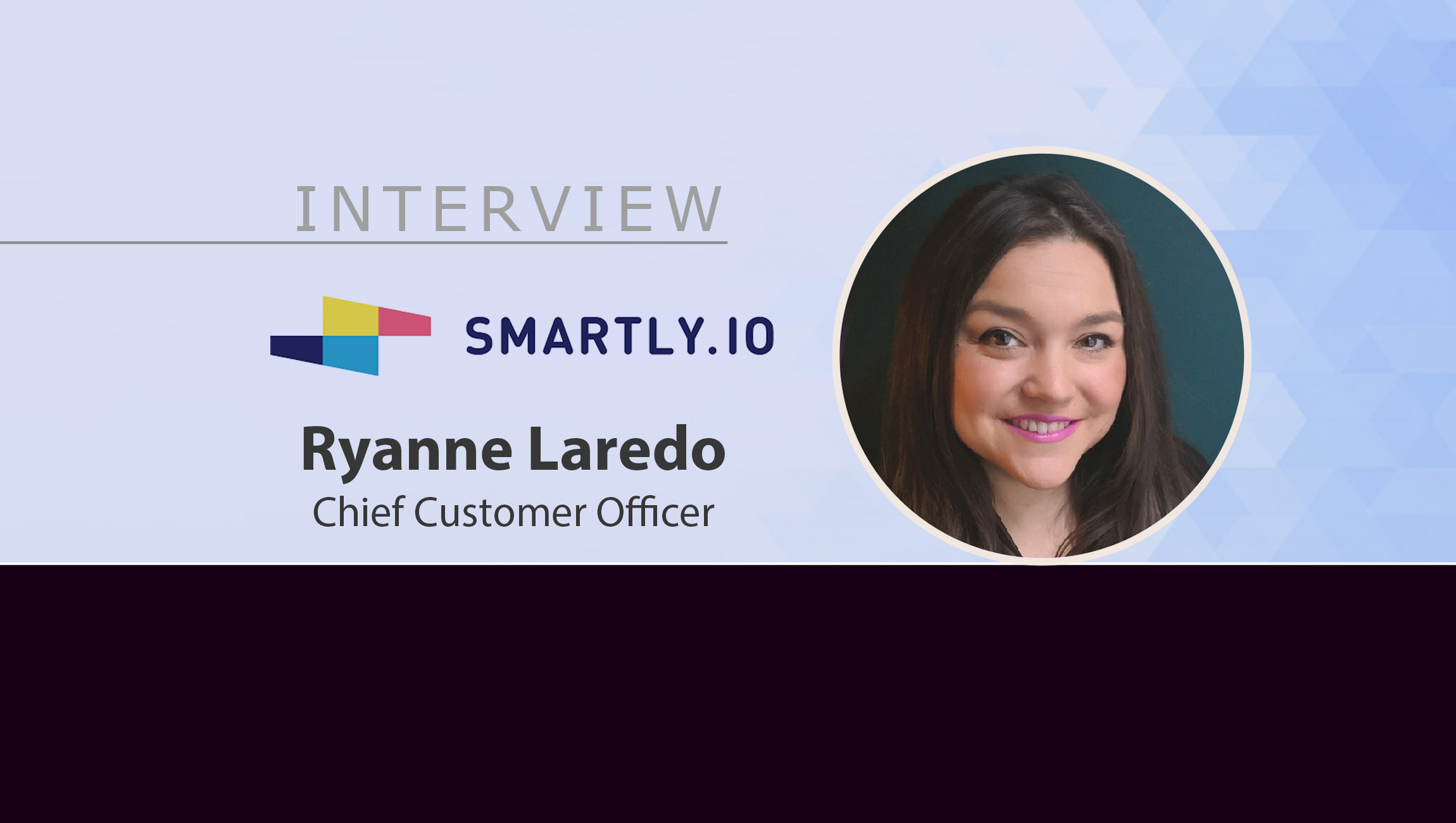As adtech continues to evolve and the need for improved contextual targeting becomes more crucial to B2B advertising strategies, B2B advertisers and marketers need to remember a few things to stay atop of their digital advertising game. Ryanne Laredo, Chief Customer Officer at Smartly.io shares some tips and observations in this quick catch-up with Martech Series:
______
Welcome to this MarTech Series chat Ryanne, we’d love to get to know you better! Tell us more about your role at Smartly.io and how your journey through the years has been in customer success/customer facing roles?
It’s an honor to be on MarTech Series; thank you for allowing me to share my story, Paroma! I serve as the Chief Customer Officer at Smartly.io, which enables brands to power effective ads and automate every step of social advertising to unlock greater performance and creativity.
I lead the customer team, ensuring Smartly.io is the best strategic partner to some of the world’s most advanced advertisers, helping them make smart and thoughtful decisions with their advertising. It made perfect sense to join Smartly.io given how important customer centricity is to the company – a founding principle. I’m excited to be part of a growing team and industry as adtech continues to expand on different platforms.
Marketing Technology News: MarTech Interview with Deepak Anchala, Founder and CEO at Slintel
Throughout my career, I’ve had the opportunity to foster customer relationships and focus on attraction, engagement, and development — keeping customers at the epicenter of everything I do. Outside of these experiences, I am committed to driving change in the adtech industry. I am a co-founder of AdTech Cares, an organization that leverages advertising technology to combat misinformation and keep humanity well. The organization of 50+ companies delivers the truth about COVID-19, supports fact-based journalism, and affirms that Black Lives Matter around the world. I’m also a founding member of Chief, a private network designed specifically for senior women leaders — rising VP level through CEO — to strengthen their experience in the C-suite and affect change from the top-down. This year I joined Kindred – a network for socially responsible leaders – in 2021 as a founding member.
In your view, what are some of the top skills a B2B Chief Customer Officer needs to have to drive better customer practices?
Customers are looking for a partner that can listen, advise and innovate to drive their brand’s business forward. These are not difficult skills – seldom are they used, however. Especially as adtech continues to change and evolve, partners must be sure to listen and serve as advisors with customers’ best interest in mind for every decision, even one as simple as the typeface displayed in an ad.
Unleashing an ongoing curiosity, enabling ongoing connections, being comfortable with the unknown and being a data obsessed individual are the skills that power effectiveness in the role. It isn’t just externally either, employees who are brought into the conversation and heard often conquer problems more quickly and are motivated to innovate on behalf of or alongside customers. Our customers, unlike B2B customers of yore, live their lives as consumers/humans accompanied by technology. The stakes are high for B2B leaders to listen and respond in ways B2C companies do with their customers.
Our customers chose Smartly.io because of our customer obsessed focus in planning our product roadmap. We partner closely with them to ensure we solve problems for them – especially in this fast-paced environment of social media platforms where technology, consumer behavior and regulation shift constantly. Having the customer at the center of everything at Smarly.io has been a key building block in our rapid growth and will continue to be the cornerstone of our strategy in the future.
How are you seeing adtech-martech evolve today in terms of user needs and innovations and what are some near-term predictions you’d like to dive into?
Adtech, like most sectors, has a big diversity problem. We have made progress, like acknowledging the problem exists. However, we’ve yet to see approaches that are easy to execute on – and 2022 is the year this needs to happen.
There will always be something that can be done through legislation – however – the adtech industry need not wait to make change, especially if we come together as an industry. We need to be sharing best practices and not weaponizing our approaches as competitive advantages. Industry bodies could also develop a unified benchmark to assist companies to better understand how they’re performing against an industry wide DEI standard, whether that be with employees, or in the presence and portrayals of those in ads, or the targeting and AI used in the transaction of ads.
Marketing Technology News: MarTech Interview with Rachel Meranus, CMO at Transfix
We also need to think like scientists within our own organizations – the same way we approach the testing and experimental side of technology. DEI can be scary if not outright difficult to make digestible for an organization let alone an entire industry. However, we should give ourselves grace; without trial and error, progress is impossible. We must test our approaches, test for bias and harm in our algorithms, continue to optimize – and then share our learnings so others can improve, driving the entire industry forward. It’s only then that we will see systemic change in our industry.
As adtech and martech platforms evolve to meet privacy needs of their users and local regulators, what are some data privacy practices that should become fundamental to brand marketers?
The adtech industry has done a poor job of having conversations with customers about how its users are using technology to ultimately make online experiences better and easier. When brand users click “opt-in” or “track cookies,” they typically don’t understand why. The result is a one-sided point of view, where consumers only see the ‘creepy’ behavior from advertising, with little to no context – leading to a hysteria around data privacy. In 2022 and beyond, smart advertisers will change this.
How? We must be honest about what the industry is doing with consumer data, and more importantly, give consumers transparent insights, education, and resources to realize what their data is being used for and why.
Can you talk about a few top challenges that still impact the way customer success and customer facing teams perform today and what kind of processes / martech-salestech can help alleviate them?
There are few tools that capture the full experience of a customer – we are working with a great set of tools at Smartly.io, but the industry is still seeing a delay in time to insight and connectivity to react to customer needs/concerns. Systems can only do so much; However, the interoperability of systems that allow for the surfacing of significant and meaningful insight, as well as reactions across different types of decision makers both inside and outside of applications, is important.
I would say that for an industry that has data scientists taking ad information to the next level in delivering personalized ads with an outcome for brands, we are grossly underutilizing those skill sets to optimize and automate tasks that can lead to a better customer and employee experience. We are well on our way at Smartly.io, but I believe broadly that this is a challenge within the industry sector that must be solved for, because of the complexity and lack of connected tool sets that move at the speed of our customer base.
Some last thoughts and marketing / martech-adtech takeaways before we wrap up?
Alongside the nearly 700 “Smartlies” from around the world, I’m excited to be at the forefront of the next generation of adtech – one that pairs automation with creativity to deliver amazing results. As the adtech space continues to change, brands are looking for partners that have their finger on the pulse of innovation. I also envision more thoughtful conversations around the responsibility brands have with the information they’re sharing (mitigating misinformation in the process) as well as ensuring DEI in the marketing and advertising spaces.
Marketing Technology News: MarTech Interview with Jason McClelland, CMO at Algolia

Smartly.io automates every step of social advertising to unlock greater performance and creativity.
Ryanne Laredo is the Chief Customer Officer at Smartly.io
Missed The Latest Episode of The SalesStar Podcast? Have a quick listen here!
Episode 105: Biggest Sales Enablement Trends and Challenges with Mert Yentur, CEO and Founder at Pitcher AG
Episode 104: CMO Best Practices with Kevin Tate, Chief Marketing Officer at Clearbit
Episode 103: B2B Optimization And Engagement Strategies With Chris Tranquill, Chief Of Strategy At Khoros











